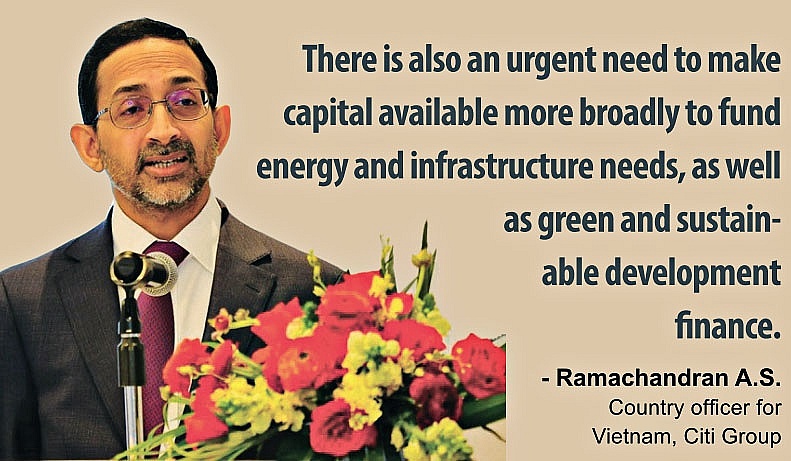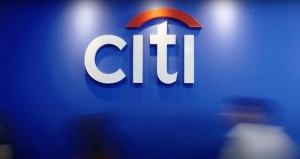Citi Group optimistic on economic outlook for 2024
“The medium to long-term outlook for Vietnam is unmistakably strong,” said Ramachandran A.S., country officer for Vietnam in his opening remarks at the forum in Hanoi. “As every nation lives its destiny, there are windows of extraordinary opportunity that sometimes open up. Vietnam is going through such an opportunity now.”
 |
Helmi Arman, the global bank’s economist who covers markets including Vietnam, estimates that supply chain shifts may support industrial production and export growth in 2024.
“Citi expects Vietnam’s exports to rebound in 2024 after shrinking by an estimated 5 per cent in 2023,” Arman said. “External demand could still be cyclically weak as global GDP growth slows, however, Vietnam is likely to continue to benefit from supply chain relocations, thereby broadening its export penetration.”
Industrial production has stabilised with sectors that Citi classifies as export-oriented such as textiles, footwear, and electronics, leading the way relative to domestically-oriented sectors. Foreign direct investment into the manufacturing sector was still robust in 2023 despite the growth downturn, which gives Citi confidence that the investment inflows into manufacturing remain strong for 2024 and the Vietnam story, as an emerging manufacturing hub, remains intact.
Looking ahead, Citi expects on-year industrial cost pressures to normalise and turn positive in 2024, but average inflation will likely not rise far from the 3.5-4 per cent range, Arman added. With regards to food, the high demand for rice from neighbouring economies could still impact domestic prices, but Vietnam’s rice production has historically been resilient to El Niño.
The real estate sector also stabilised in the second half of 2023, but a V-shaped recovery is not the bank’s base case. After falling in early 2023, real estate transactions began to recover in the second half of the year, following cuts in interest rates and the implementation of debt restructuring allowed under new regulations. Citi believes social housing has the potential to recover, given Vietnam’s urbanisation rate is still low and foreign investment flows are still strong.
Citi sees credit demand gradually recovering along with the improved outlook for GDP growth and normalisation of producer costs, which naturally increases demand for working capital credit. Vietnam’s trade surplus will likely narrow in 2024 as domestic demand recovers. Hence, Citi expects the current account surplus to decline from an estimated 6 per cent of GDP in 2023 to a figure with a 4 per cent handle this year.
“The most substantial shocks of 2023 to Vietnam’s economy seem to be behind us. We are poised for a strong recovery this year, but to enable high growth, there is an urgent need to make international capital available more broadly, to fund energy and infrastructure needs, as well as green and sustainable development finance,” said Ramachandran A.S. “Vietnam needs over $135 billion during the next seven years for power generation and transmission alone. International capital is imperative to achieve this goal.”
 Citi executive elected chairman of AmCham Vietnam in Ho Chi Minh City Citi executive elected chairman of AmCham Vietnam in Ho Chi Minh City |
 Citi closes out the year as top equity house in Asia Citi closes out the year as top equity house in Asia |
What the stars mean:
★ Poor ★ ★ Promising ★★★ Good ★★★★ Very good ★★★★★ Exceptional
Related Contents
Latest News
More News
- State corporations poised to drive 2026 growth (February 03, 2026 | 13:58)
- Why high-tech talent will define Vietnam’s growth (February 02, 2026 | 10:47)
- FMCG resilience amid varying storms (February 02, 2026 | 10:00)
- Customs reforms strengthen business confidence, support trade growth (February 01, 2026 | 08:20)
- Vietnam and US to launch sixth trade negotiation round (January 30, 2026 | 15:19)
- Digital publishing emerges as key growth driver in Vietnam (January 30, 2026 | 10:59)
- EVN signs key contract for Tri An hydropower expansion (January 30, 2026 | 10:57)
- Vietnam to lead trade growth in ASEAN (January 29, 2026 | 15:08)
- Carlsberg Vietnam delivers Lunar New Year support in central region (January 28, 2026 | 17:19)
- TikTok penalised $35,000 in Vietnam for consumer protection violations (January 28, 2026 | 17:15)

 Tag:
Tag:


















 Mobile Version
Mobile Version